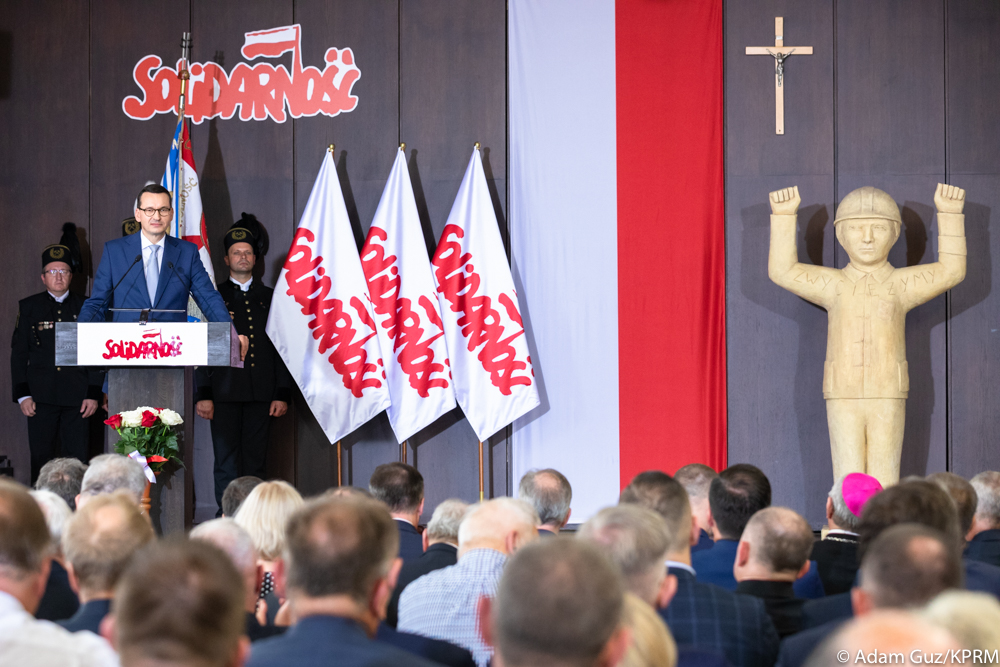By Jacqueline Hayden
Forty years after witnessing the birth of Solidarity in the Gdańsk shipyards, I ask myself how the umbrella movement of many colours that helped topple Poland’s communist regime has morphed into an ally of today’s populist government, which has undermined much of Poland’s democratic progress since 1989, and how the trade union has itself become a leading conservative voice, critical of LGBT+ rights and other liberal values.
What was Solidarity?
I’m Irish, so we sometimes answer a question by first posing another. When I first went to Poland in July 1980 – weeks ahead of the historic Gdańsk Agreement of 31 August that led to the creation of Solidarity – I was privileged to meet and spend time with many individuals who would later become famous heroes of the movement. So what was Solidarity at its core?
Was it modelled on the pragmatism of charismatic shipyard electrician Lech Wałęsa, or was it closer to the purist Anna Walentynowicz, the heroine of Gdańsk who would later denounce Solidarity and Wałęsa for selling out the revolution?
Anna Walentynowicz, the Solidarity co-founder and "mother of Polish independence", is among the 100 #womenoftheyear named today by @TIME magazine for every year going back to 1920.
The cover is illustrated by Polish artist Agata Nowicka.
More here: https://t.co/9aU3pqseJn pic.twitter.com/xYcuGKx2Vi
— Notes from Poland 🇵🇱 (@notesfrompoland) March 5, 2020
Was it moulded in the likeness of Europhile Bronisław Geremek, or was its heart pounding with the atavistic passion of Jarosław Kaczyński and his longing for a return of former Polish glory?
Poland’s strong Catholic faith always underpinned Solidarity, but was it the Catholicism of the uncompromising Cardinal Józef Glemp? Or the more intellectually open and spiritual faith of Solidarity’s first chaplain, Father Józef Tischner?
The answer, of course, is that it was all of the above, and more besides. The Solidarity umbrella sheltered all political persuasions – anti-communists, communists who rejected Soviet communism, nationalists, neo-Marxists, Trotskyists and soon to be liberal marketers of all shades.
None of these disparate groups agreed on much – except, that is, their desire to bring down the government. Once that was achieved, the coalition began to unravel.
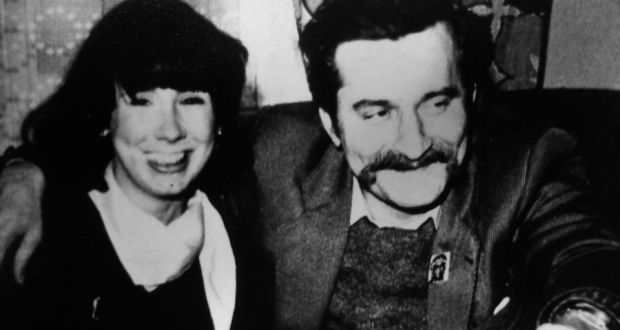
The author with Lech Wałęsa at Solidarity’s offices in Gdańsk, December 1980
The glue binding the opposition
One group who occupied a vital and consequential space under the Solidarity umbrella was the Catholic church. The church was the glue that kept the fractured opposition movement together; it was the interlocutor between “the people” and the PZPR, the Polish communist party, long before Solidarity emerged in 1980 after the Gdańsk strike, and it would be the guarantor of the Round Table deal that resulted in the first semi-free elections in 1989.
Unlike many of its associates sharing the Solidarity umbrella, the Catholic hierarchy had a clear template for the Poland they envisioned after communism, and their gaze was firmly focused on the re-Catholicisation of the Polish constitution.
What we see around the fall of the communist government is a sharp resurgence of the Catholic church in political life, as it tried to institutionalise an ethnic-Catholic vision of the nation through public policies for fear of losing social control in the newly democratic state.
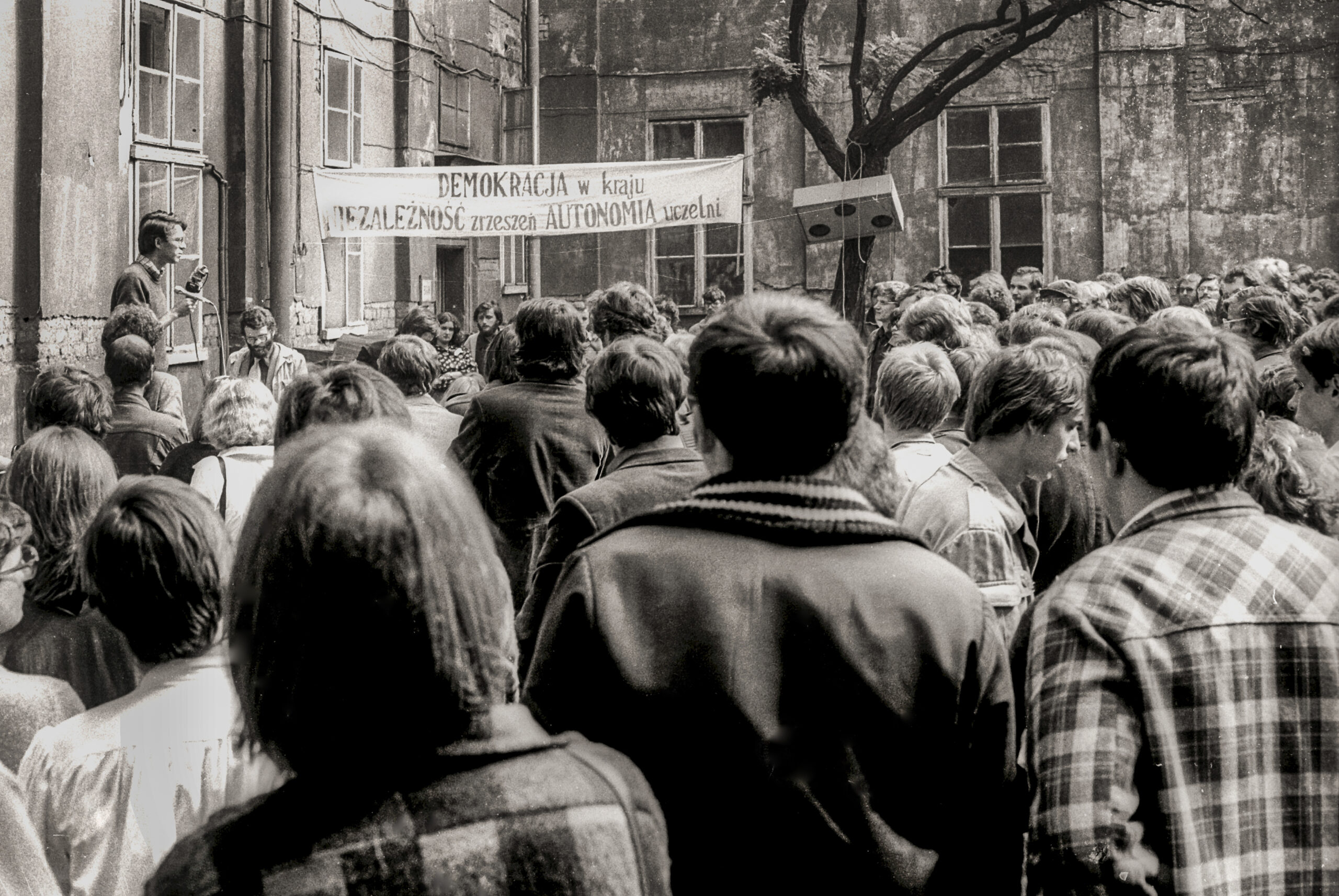
Rally organised by the Student Solidarity Committee, Kraków, September 1980 (© Jerzy Ochoński/photospoland.com)
And so women, their reproductive rights, contraception and sex education became embroiled in the Catholic church’s battle to stamp a strong imprint upon the new Polish constitutional order. The battle to reframe Polish identity in post-communist Poland left secular voices at a considerable disadvantage.
Identifying with values such as equality for women and access to contraception and abortion was repugnant not least because of the association with the atheist, alien and imposed values of the communist “other” or “them”. In this climate, secularist and other voices from Solidarity’s liberal wing dud not stand a chance.
The underestimated church
I was in Poland on many occasions during and after 1989. I made repeated visits there in the tumultuous period in the early 1990s when the battle for a new Polish constitutional order was raging. In March 1992 I interviewed Polish Primate, Archbishop Józef Glemp, at the palace in Warsaw. I wanted to hear his views on the role of the church now that communism was defeated.
He refused to begin our interview until he had made it clear that he rejected what he said was the implicit inference in my list of questions that the church “was just another political group seeking to promote its version of social norms“. He then went on:
I can only answer your questions on the understanding that you accept the terms in which the church sees itself. The church opposed Napoleon, Nazism, capitalism and socialism, and it is in opposition right now to everybody who sees man in a different way than the church does…That’s why we opposed communism and why now we will oppose all the new ideologies which will question our basic truth.
The church’s belligerence was underestimated by both secular post-Solidarity nascent political parties and by academics and commentators. The sociologist Edmund Wnuk-Lipiński remarked to me in 1992 that “after the collapse of communism, the church was like a balloon with no limits. It was expanding everywhere. Like Solidarity, which had to manage a self-limiting revolution, the church will have to manage a self-limiting expansion of its role…They’ll learn to temporise”.
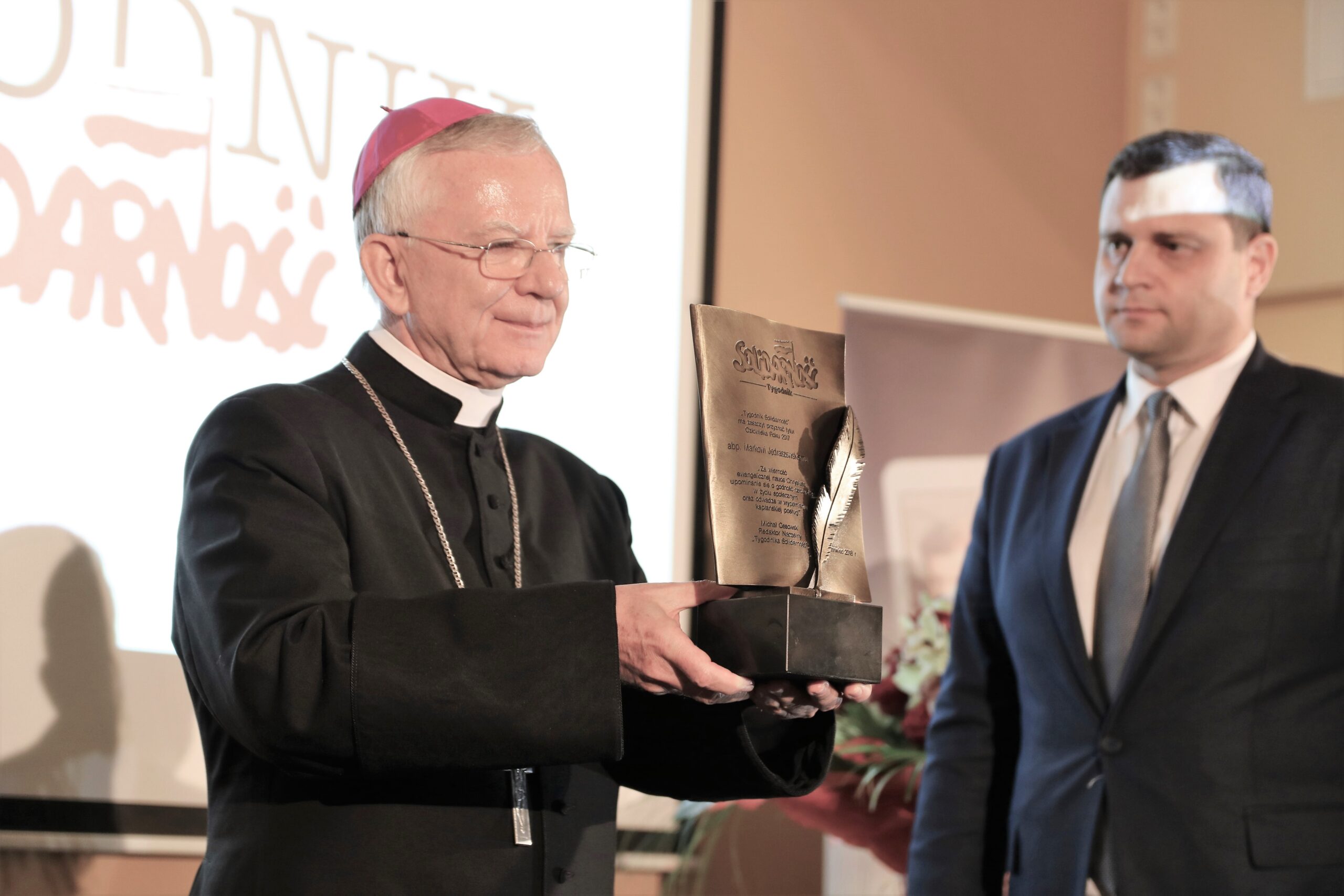
The Archbishop of Kraków receiving Solidarity Weekly’s “Man of the Year” award in 2018 for his “defence of fundamental Christian values”
This optimistic expectation that the church would step back from pushing its claim for a confessional state underpinned the reasoning behind a huge tactical error which arguably resulted in a fatal assault, not only women’s human rights but, on secular social values more generally.
Joanna Caytas writes:
During the early 1990s, the position of any candidate for public office on abortion became the single most important litmus test for differentiating new political parties. Support for a ban on abortion became synonymous with support for nationalism, patriotism, and religious piety in the reconstituted Polish democracy. The political left inherited from the communist legacy its postulate for rooted in the socialist agenda.
Hence, as Anne-Marie Kramer notes, “[t]he abortion debate comes to stand as a symbol of ideological conflict between two competing nation-building projects.”
“True Poles”
A further factor in Solidarity’s slide to the right, and the regressive path which means that it no longer offers shelter to secular or liberal tendencies, can be traced to the fact that the collapse of communism in Poland did not result from a revolution but from a politically engineered compromise between the umbrella Solidarity group and an alliance of soft-line, reform-minded communists.
While the Round Table compromise and deal were the basis of the initial success of the Polish transition, they left open the space for claims of treachery against Solidarity negotiators. Characterising the deal as a sell-out allowed those Solidarity activists who denounced the Round Table to frame themselves as “True Poles”.
Relying on often explicit anti-Jewish rhetoric, some parts of this particular post-Solidarity grouping, which would eventually solidify under the banner of Law and Justice (PiS) – today’s ruling party – seized the high ground of true Polish identity; that identity was essentially Catholic in every aspect of its moral and social compass.
Many of those Solidarity activists who were a key force supporting the Round Table compromise, such as Bronisław Geremek, Jacek Kuroń and Jan Lityński, would eventually morph into Freedom Union (Unia Wolności). Socially progressive and economically liberal, in the early years this wing of Solidarity heartily backed the famous Balcerowicz Plan, or “shock therapy”, inspired by Jeffrey Sachs and the Washington Consensus.
Later they would be accused of not only entering a poisonous deal with the communists but of having sold Poland’s assets to the highest bidder during the massive privatisation process.
Solidarity economist Ryszard Bugaj, who would later found the more leftist Labour Union (Unia Pracy), was one of many who deeply criticised the severity of the Balcerowicz Plan. He championed the cause of those left behind by shock therapy.
While this is not the place for a deep analysis of the social and political impact of the economic transition on Polish society, it is important to acknowledge that many of those who saw themselves as the losers in the process of economic transition associated their loss with the economic liberals who also championed a secular and Europhile vision of post-communist Poland.
Jarosław Kaczyński, the founder and still chairman of PiS, has been the ultimate beneficiary of the so-called losers in the transition. The PiS brand of atavistic evocation of the True Pole as “us” has been a powerful weapon in the Polish culture wars against the new “them”, the Enlightenment inspired liberals accused of supporting un-Polish values such as LGBT+ rights.
Given that some of the Solidarity activists in Freedom Union were dissident intellectuals with Jewish backgrounds, they were especially vulnerable to having their bona fides as True Poles questioned. Nowhere was this more unfortunate in its consequences than in the constraints it placed on their capacity to navigate a secular model in the creation of a new post-communist Polish identity and constitution.
Sacred versus secular
Freedom Union and other post-Solidarity groups positing a secular prescription for the new Poland were further hamstrung by the fact that many of the values they might have wanted to champion were the very social values and principles which were discredited by association with the communist constitution.
Secular values, including the role of women enshrined in the 1952 communist constitution, were, by association, suspect and could be characterised as alien to so-called real Polish values.
Given political realities, it is arguable that women didn’t stand a chance as various actors preyed on the internecine nature of the divisions in Solidarity in the early 1990s. Women’s reproductive rights were low down the priorities of political actors trying to form viable coalitions in a state of dis-equilibrium.
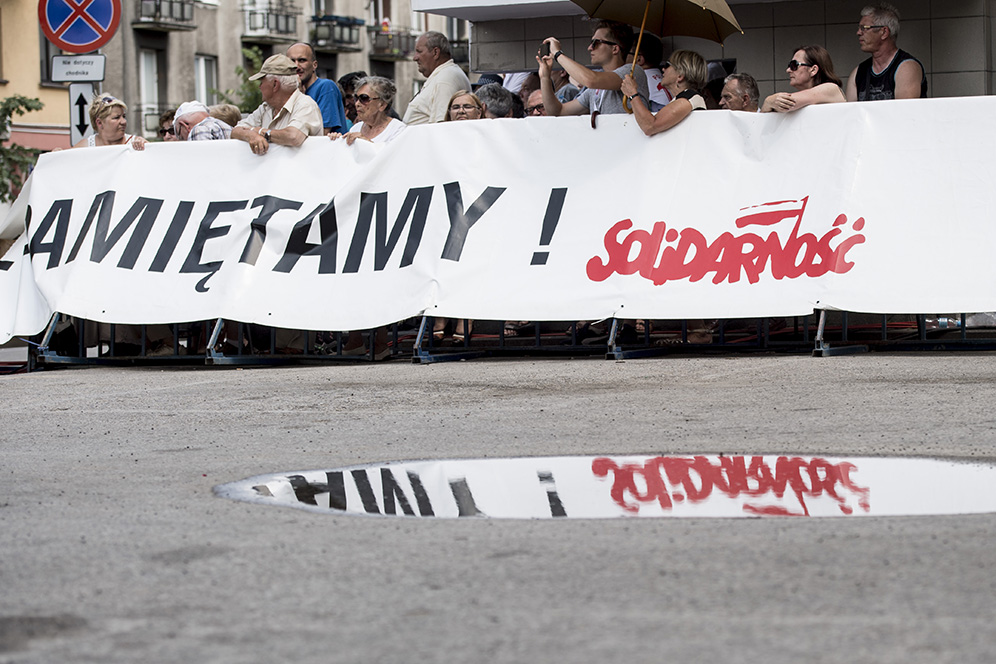
Commemoration of the 40th anniversary of the Radom workers’ protest, June 2016 (P.Tracz/KPRM)
The Catholic church was kingmaker, or, in the parlance of political science, the veto player. As Teresa Kulawik writes: “Reluctance to clash with the church was the historic compromise of the post-1989 order, a compromise that sacrificed women’s rights”.
Former dissident intellectual and then Democratic Union MP Jan Lityński was direct in his acceptance that the strategy of placating the church in order to protect the post-transition economic reform package had been a failure. Speaking after the defeat of the Solidarity coalition government in 1993, Lityński told me that:
The people have rejected the level of church interference. Our mistake was that we didn’t recognise it. We should have clearly criticised some of the tendencies. But we were afraid of attacks from right-wing elements within the church. We tried to have relations with them because we wanted them to leave the rest of the reforms alone. It was a mistake.
“Solidarity was born under the cross”
A big mistake indeed. The Solidarity trade union’s current leader, Piotr Duda, recently declared that Solidarity was born “under the cross”, while the trade union’s weekly paper asked, “is LGBT a neo-Marxist ideology?” Its editor has also argued that LGBT groups are “attacking Christian values” and “calling for discrimination against those who think differently”.
In endorsing incumbent President Andrzej Duda ahead of the presidential election, Solidarity’s Piotr Duda revealingly called opponent Rafał Trzaskowski a “hardened liberal” who would roll back many of the policies that have helped workers. And therein lies the clue to why a union, at one time apparently an all-embracing tent, now identifies with conservative, Catholic and often far-right political forces.
When Solidarity’s liberal, intellectual wing focused on state-building in the years after 1989, the rump of the trade union was left to carve out a different role. As it morphed into a more normal trade union, its interests diverged radically from the liberal elements among the holy trinity of dissidents, church and workers which had successfully toppled communism.
In recent times, when Solidarity supported PiS in its efforts to limit Sunday trading, it did so in the knowledge that agreement on preserving Sunday for going to Mass was a happy confluence of the interests of a populist government, the Catholic church and some grateful workers.
In the coming together of PiS, Solidarity and the Catholic church we are seeing the perfect storm of mutual interest. Together they peddle a compelling, easy to digest narrative that conflates liberal economics and liberal social values with anti-worker and anti-Polish values. All three are winners, and crucially for Kaczynski, PiS gets to reclaim the Solidarity brand from the liberal, intellectual traitors whose vision of a secular Poland he excoriates.
'Is LGBT a neo-Marxist ideology?' asks the Solidarity union's weekly newspaper.
The editor writes that LGBT groups are 'attacking Christian values' and 'calling for discrimination against those who think differently'.
An interviewee says they are committing 'symbolic violence'. pic.twitter.com/2nJbxNPXZh
— Notes from Poland 🇵🇱 (@notesfrompoland) September 22, 2019
From the vantage point of summer 2020, with nearly 100 Polish municipalities, mostly under PiS control, adopting anti-LGBT+ resolutions, I would argue that the failure of Solidarity’s liberal wing to defend human rights, women’s rights and secular values in the early days of the democratic transition left the door wide open for those who wanted to re-brand Solidarity in the mould of what Geneviève Zubrzycki calls an ideologically constructed, dominant “ethno-Catholic narrative” of Polish history.
Watching the massive LGBT equality parade march near the Palace of Culture in June 2019 I did not know whether to be sad or happy: sad that such demands, along with a massive show of solidarity, were necessary, or happy that the crowds were so big.
Mostly, I was sad that Solidarity had lost its way, and as much as I admired the liberal wing of the union who championed shock therapy, I had to admit to myself that in privileging the economic deal over commitments to social and human rights and the protection of transition losers, they had, in football parlance, dropped the ball.
Main image credit: Adam Guz/KPRM
